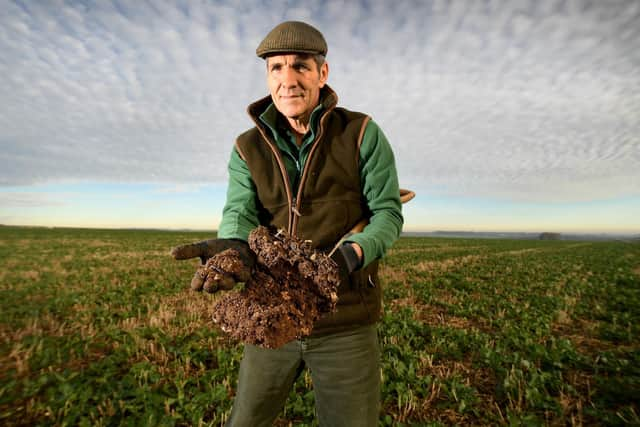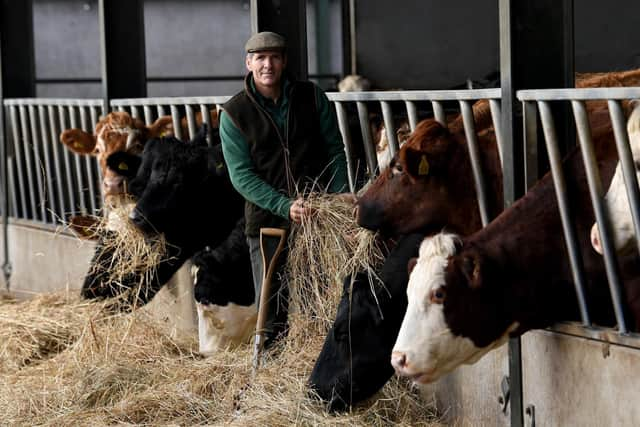Farm of the Week: The Wolds ploughman who has gone no-till on his land since Brexit
Paul Temple switched to Stabiliser cattle nearly two decades ago, but it is his more recent move to a no-till regime that, combined with his beef herd, has led to a major farming award as Mixed Farmer of the Year.
Paul farms at Wold Farm between Driffield and Langtoft where he is a third-generation tenant, following his grandfather Hubert Simpson Temple and father Bruce, across around 940 acres.
Advertisement
Hide AdAdvertisement
Hide AdMany may recall Paul from when he was a leading player in the NFU and more recently he has been chair of AHDB’s cereals and oilseeds committee. His latest extra curricular role in agriculture is director of the Global Farming Network an organisation that is proving dear to his heart.


Paul said the Global Farming Network is about encouraging farmers to advocate science and share knowledge and experience.
“I’m currently learning about biology in a way I never anticipated. I’m finding it so exciting. My education was very much around physics and chemistry. There is a book called The Ploughman’s Folly produced in the 1940s and quite why we didn’t touch on it at agricultural college I don’t know, but it is about understanding micro-organisms, fungi and bacteria. Things many of us have never quite understood.
“I’m a ploughman by instinct. I genuinely love ploughing but we were starting to work the land deeper and deeper without any benefit. We had soils that, if it rained just after you had cultivated them, slumped and then might set like concrete.
Advertisement
Hide AdAdvertisement
Hide Ad“I’d watched how farmers were going no-till in North and South America but I wasn’t sure about it with our maritime climate. It was Tony Reynolds, who farms in Lincolnshire, who I would class as having been my mentor for going no-till. It was Tony’s influence that helped me make my final decision.”


Paul said there was another influence that played its part too.
“Brexit was the other. I pretty much knew that any government money would be going into environmental schemes and that we wouldn’t be able to capture it here, so I had to reduce my cost of production. We haven’t ploughed anything since 2017. It’s not for the fainthearted and it’s not pretty, but I subscribe to the theory that once you’ve stopped, unless you’ve got yourself into a catastrophic mess, you should stick with no-till.”
Nearly half of Paul’s farmed area is down to grass and around 500 acres is made up of arable cropping. Paul said that while he has lowered his production costs, he has also reduced his yield expectation.
Advertisement
Hide AdAdvertisement
Hide Ad“We were pushing for just short of five tonnes per acre on winter wheat, but with no-till and what that involves we are now looking for just over four tonnes per acre.
“Wheat makes up around half our arable acreage on what is reasonably forgiving medium chalk Wolds land that has some clay. The chalk keeps it open. The land just off the Wolds is a little more challenging, a sand-based loam that is strong medium but still reasonable.
“We grow pretty much all first wheats for seed with a little feed wheat. This year we have Graham and Champion for Openfield; and Dawsum and Extase for Grainco. We have a discipline of keeping weeds out of the crops.”
Paul’s Stabiliser herd runs to 550 head when his 240 suckler cows have all calved, with calving starting from February 1 and running through to the end of April and into May. Paul said his biggest influence in going with Stabilisers was Richard Fuller who instigated the breed through the Beef Improvement Group.
Advertisement
Hide AdAdvertisement
Hide Ad“Richard was a transformative person for the suckler beef industry. He clearly laid out the benefits of the breed.
“We are now on our 25th Stabiliser bull and have eight stock bulls at present. We’d had Charolais, Limousin and Blondes over the years but we’ve now had Stabilisers as our terminal sire for a number of years and the cows are becoming predominantly Stabilisers too.
“They make perfect sense to me. They graze well on poorer grasses and they are quiet and excellent mothers. They enable us to take the labour out of the job. Our target is to get to 300 cows because we believe that’s the point at which it consumes one person’s labour. We are just trying to run the herd as efficiently and simply as we possibly can.”
Paul said it is a closed herd except for new bull purchases and that the main roles of the herd are producing replacement bulling heifers and beef animals destined for the meat industry.
Advertisement
Hide AdAdvertisement
Hide Ad“We keep the first seven weeks’ worth of male calves entire and they are weaned at seven to eight months and sold as bull stores around October and November to regular repeat business with a buyer coming to purchase what is usually 80-head of store bulls.”
Paul said he enjoys being involved with the Global Farming Network.
“It’s a brilliant organisation and sprang from US farmers who wanted to put farmers from around the world round the table. Sharing information is so important and we reach over 60 countries with lots of smallholder farmers in Africa and India right up to the bigger ranches of North and South America.”
Paul is married to Liz Falkingham who was also involved at a national level with the NFU and has a livery business at the farm. Paul, Liz and his parents Bruce and Gillian are all partners in the family farm. Paul has a son and a daughter, Michael and Laura, who both work in the agricultural industry.
Advertisement
Hide AdAdvertisement
Hide AdPaul said he has been fortunate to have undertaken roles away from the farm, but that none of it would be possible without two great lads who work with him.
“I’m lucky to have done other things, but I still absolutely love the act of farming.”
